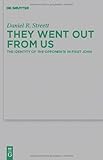
Will I have abs like this in the resurrection?
Luke 20 adds several elements to the Markan version of Jesus’ discussion with the Sadducees: οἱ δὲ καταξιωθέντες τοῦ αἰῶνος ἐκείνου τυχεῖν καὶ τῆς ἀναστάσεως τῆς ἐκ νεκρῶν οὔτε γαμοῦσιν οὔτε γαμίζονται·οὐδὲ γὰρ ἀποθανεῖν ἔτι δύνανται, ἰσάγγελοι γάρ εἰσιν καὶ υἱοί εἰσιν θεοῦ τῆς ἀναστάσεως υἱοὶ ὄντες (20:35-36).
First, Luke explains why there is no need for marriage in the resurrection. Jesus assumes that marriage is for procreation; and, there is no need for procreation in the resurrection since resurrected people cannot die. Second, we see that “sons of God” is basically synonymous (or at least very close to) “angels”–not a surprise given the OT background of the term. Third, we have a slightly different wording in Lk than in Mt/Mk: Luke has ἰσάγγελοι while Mt/Mk have (ὡς ἄγγελοι). Fourth, when Jesus explains the statement at the burning bush, he adds in Luke: “for all are alive to him” (πάντες γὰρ αὐτῷ ζῶσιν).
Luke’s term ἰσάγγελος is very interesting. LSJ gives only 2 citations for it, our passage in Luke and a usage in Hierocles, a 5th CE neo-platonist (there it is used in parallel with ἰσοδαίμων [divine]). BDAG gives us a bit more information, including a Christian grave inscription that draws on Lk 20, and most importantly, a reference to Philo, in his treatise On the Sacrifices of Abel and Cain, 5.
Philo does not use the exact word but a phrase that is very close: καὶ γὰρ Ἀβραὰμ ἐκλιπὼν τὰ θνητὰ “προστίθεται τῷ θεοῦ λαῷ,” καρπούμενος ἀφθαρσίαν, ἴσος ἀγγέλοις γεγονώς· ἄγγελοι γὰρ στρατός εἰσι θεοῦ, ἀσώματοι καὶ εὐδαίμονες ψυχαί· Here Philo speaks of Abraham being “gathered to his people.” My LXX reads προσετέθη πρὸς τὸν λαὸν αὐτοῦ. Philo, however, cites it as being added to the “people of God” (τῷ θεοῦ λαῷ), which he apparently takes to refer to the heavenly host, the angels. Thus, Philo concludes, Abraham was made equal to the angels, which means he became an incorporeal soul (ἀσώματος ψυχή). This is a pretty good parallel to Luke 20, I think, since Jesus there uses the patriarchs as a model of resurrection existence, which is described in terms of angelic existence, seen as discontinuous with the present embodied existence.






Interesting article., especially the confirmation of belief in the afterlife. Which Greek font do you use?
Thanks, Aldred. I use whatever the default WordPress font is. It’s unicode, with combined diacritical marks.
Ηι! Μy view:
Luk 20:33-36 ἐν τῇ ἀναστάσει τίνος αὐτῶν γίνεται γυνή; οἱ γὰρ ἑπτὰ ἔσχον αὐτὴν γυναῖκα. 34 καὶ ἀποκριθεὶς εἶπεν αὐτοῖς ὁ ᾿Ιησοῦς· οἱ υἱοὶ τοῦ αἰῶνος τούτου γαμοῦσι καὶ έκγαμίσκονται· 35 οἱ δὲ καταξιωθέντες τοῦ αἰῶνος ἐκείνου τυχεῖν καὶ τῆς ἀναστάσεως τῆς ἐκ νεκρῶν οὔτε γαμοῦσιν οὔτε γαμίζονται· 36 οὖτε γὰρ ἀποθανεῖν ἔτι δύνανται· ἰσάγγελοι γάρ εἰσι καὶ υἱοί εἰσι Θεοῦ, τῆς ἀναστάσεως υἱοὶ ὄντες.
Their question was a particular one. To whom will she be a wife to?
And His answer to it was: there is no marriage in heaven.
And He explains: because they are “equal to” or “as” (Matt.20:30, Mark 12:25) angels and sons of God.
This “and” there, is very important. By it seems that He distinguishes between angels and sons of God as if in His mind they are different. This being true, He is just using both (angels and sons) to point out something they have in common which would explain why people as well don’t get married in heaven: both angels and sons of God, do not die, hence there is no need to get married and procreate.
I believe Luke uses the word ἰσάγγελοι (equal to angels) since it is true that Christians will be equal to them, that is, in the sense that they are eternal. Being eternal is one aspect that both angels and sons of God share. But being sons of God, is a very higher priviledge and authority than being an angel.
So I don’t see Luke’s words as meaning that we will be angels, but like angels. Something that to me at least drives this point through, is the fact Matthew and Mark write “as angels”. How can they have this view, if they believed we will be angels and not just “as angles”? This means that Luke’s “equal to angels” means equal to angels in one particular aspect.
(Hope my english is good enough here.)
Thanks for you time. Interesting topic.
Thank you for this lucid article, Daniel. I had been trying to find where Philo uses this language. This Philonic use must surely be the background for Luke’s use, although I find it curious that, whereas Philo assumes becoming “equal to the angels” equals bodilessness, Luke doesn’t seem to, as his resurrection story (Luke 24) makes clear. It makes you wonder why he would allude to Philo here. Any thoughts?
Thanks for the comment. I’m not sure that Luke is drawing on Philo here. It seems more likely to me that they both attest to the existence of a Hellenistic Jewish tradition that understood the resurrected state as angelic but did not necessarily agree on what that meant, i.e. whether it was sarkic, “soulish,” or pneumatic. We often see discussion in Jewish literature re: whether angels are bodily and, if so, what the body consists of—fire, wind, ability to shapeshift, etc. Fascinating stuff!
Ah yes, thanks, that may be it. Can you point me toward the Second Temple Jewish literature that discusses angelic bodies/bodilessness?
Your comment is provoking more thought for me with respect to Luke and Paul — Luke has Jesus expressly deny that he is (pure?) pneuma and affirm that he has sarx, whereas for Paul resurrection means pneumatic bodily existence and emphatically not sarkic or psychical.